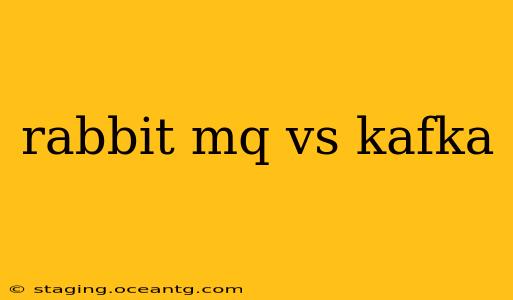Choosing the right messaging system for your application can be a critical decision, impacting performance, scalability, and overall architecture. Two of the most popular choices are RabbitMQ and Kafka, each with its own strengths and weaknesses. This comparison will delve into the key differences to help you determine which platform best suits your specific requirements.
What is RabbitMQ?
RabbitMQ is a robust, feature-rich message broker based on the AMQP (Advanced Message Queuing Protocol) standard. It offers a wide range of features, including message persistence, various exchange types (direct, topic, fanout, headers), and support for multiple protocols beyond AMQP, like STOMP and MQTT. This makes it highly versatile and adaptable to different integration scenarios. RabbitMQ excels in scenarios demanding robust message delivery guarantees and complex routing.
What is Kafka?
Kafka is a distributed, high-throughput streaming platform developed by LinkedIn. It's optimized for handling massive volumes of data streams in real-time. Unlike RabbitMQ's focus on individual message delivery guarantees, Kafka prioritizes speed and scalability, treating messages as a continuous stream of data. It's often preferred for applications needing high-velocity data ingestion and processing, such as log aggregation, real-time analytics, and event sourcing.
RabbitMQ vs. Kafka: A Detailed Comparison
Here's a breakdown of key differences to help you decide:
1. Message Delivery Guarantees:
- RabbitMQ: Offers robust message delivery guarantees through features like message persistence and acknowledgements. Messages are typically delivered at least once, although configurations allow for exactly-once semantics with careful design.
- Kafka: Prioritizes throughput over strict delivery guarantees. Messages are typically delivered at least once. Achieving exactly-once semantics in Kafka requires more complex design patterns and considerations.
2. Scalability and Performance:
- RabbitMQ: Scales well but may require more effort in terms of cluster management and configuration to handle extremely high volumes.
- Kafka: Designed for exceptional scalability and high throughput. Its distributed architecture allows for horizontal scaling to handle massive data streams with ease.
3. Data Storage:
- RabbitMQ: Stores messages in memory or on disk depending on configuration. Persistence ensures message durability even in case of broker failure.
- Kafka: Persists messages to a distributed, fault-tolerant log, ensuring high availability and durability. This log is append-only and optimized for sequential reads, enabling high performance.
4. Message Ordering:
- RabbitMQ: Guarantees message ordering within a single queue. Achieving ordering across multiple queues requires careful design and coordination.
- Kafka: Provides strong message ordering within a partition. Partitions allow for parallel processing while maintaining order within each partition.
5. Message Consumption:
- RabbitMQ: Uses queues for message consumption. Consumers typically pull messages from a queue.
- Kafka: Uses topics and partitions. Consumers subscribe to topics and consume messages from partitions. Kafka supports both pull and push consumption models.
6. Use Cases:
- RabbitMQ: Ideal for applications needing robust message delivery, complex routing, and interactions with various systems. Examples include microservices communication, task queues, and enterprise messaging.
- Kafka: Best suited for high-velocity data streams, real-time analytics, log aggregation, and event streaming. Examples include real-time data pipelines, stream processing, and event-driven architectures.
7. Community and Ecosystem:
Both RabbitMQ and Kafka have strong, active communities and extensive documentation. However, Kafka's ecosystem might be considered slightly larger, especially in the realm of stream processing tools and integrations.
Which one should you choose?
The optimal choice depends on your specific needs.
-
Choose RabbitMQ if: You require robust message delivery guarantees, complex routing logic, and a more mature, feature-rich platform with broad protocol support. It's a good choice for applications with moderate to high message volumes where reliability is paramount.
-
Choose Kafka if: You need to handle extremely high-volume data streams in real-time, prioritize throughput and scalability over strict delivery guarantees, and require a platform optimized for large-scale data processing.
This comparison provides a starting point for your decision-making process. Thorough evaluation of your specific requirements, considering factors like message volume, delivery guarantees, scalability needs, and existing infrastructure is crucial in making the right choice.
